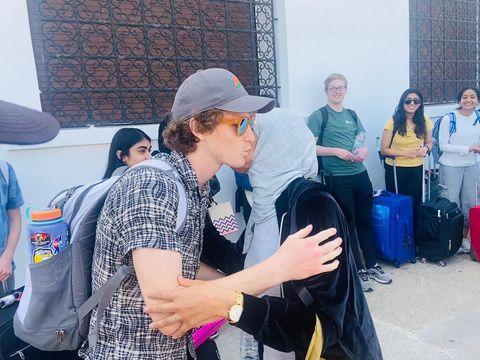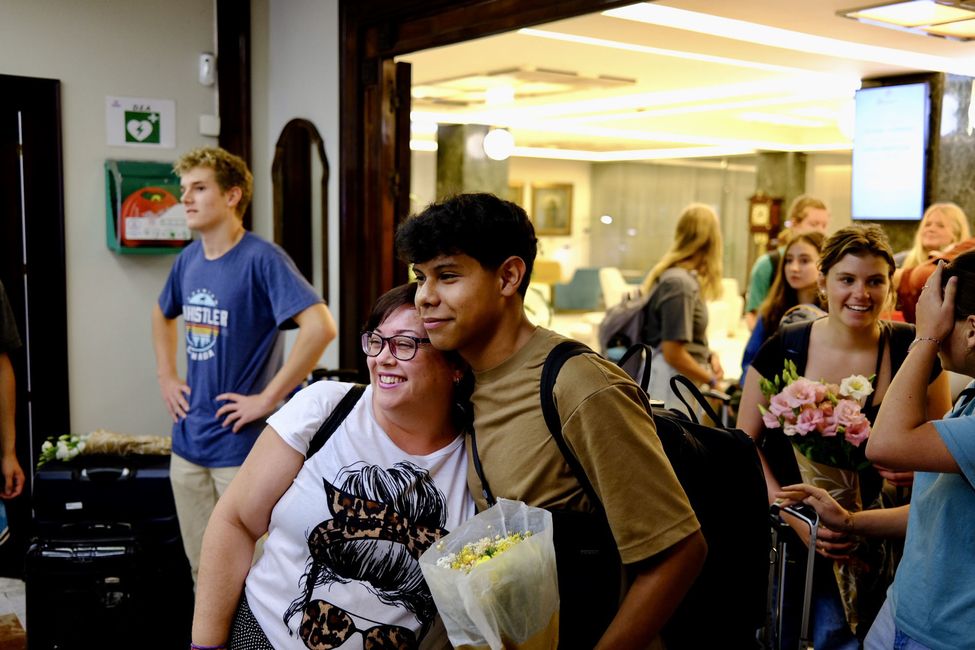How Are High School Semester Abroad Host Families Selected?
The host family experience is the heart of spending a semester or academic year abroad during high school. It's where most language and culture learning occurs and where our students form meaningful relationships that often extend far beyond their time abroad.
While staying with a host family has fantastic benefits, we understand that you may be a bit worried about traveling across the world and living with people you don’t know! This blog will answer your questions about host families—how host families are selected, some tips on how to build amazing relationships with your host family, and why the experience is worth it.
What Is a Host Family?
A host family is a local family that opens their home to international students. During your semester abroad, a host family's home becomes your home.
They provide you with daily meals, a safe place to stay, and introduce you to local customs and traditions. They also offer support and guidance in unfamiliar environments.
Host families speak to you in the dominate language of the country you’re in, the language you are learning while in that country (if studying abroad in a non-English speaking country). Host families are not required to speak English, as they are meant to communicate with international students in the local language.
It's important to note that a host family does not always consist of two parents and their child or children. Host families may be multigenerational, single-parent families, couples without children, or single adults.
Host families may be of different economic classes, and their homes may vary from apartments to stand-alone houses.
Lastly, host families typically live in smaller cities or suburbs outside of large metropolitan areas like Berlin, Seville, Kyoto, or Toulouse. This is a good thing! Smaller cities and towns provide a better setting for immersion. There are fewer tourists or other English speakers. Students can integrate into the local community more quickly; when there are fewer people, there are fewer people to get to know, and the physical landscape is easier to navigate. Living in a small town provides an authentic, intimate experience that simply can't be replicated in a big city.
How Does CIEE Select Host Families?
All CIEE host families are thoroughly vetted to ensure a safe and enjoyable experience during your high school semester abroad.
CIEE staff members who live in that country are the ones in charge of host families, carefully identifying, interviewing, and screening them.
While the details of the selection process vary from place to place, all CIEE host families undergo the following in the selection process:
- CIEE staff visits their home to ensure it meets our standards. The CIEE staff visits every room of the home, including common spaces.
- CIEE staff ask family interview questions to get to know every member of the family and ensure they are a good fit to host.
- At select locations, members of the host family who are 18 years old or older are required to pass a background check.
- Homestay families must speak the local language and understand the local culture well.
Read more about CIEE’s safety standards during a semester abroad program.
4 Tips to Build an Amazing Relationship with Your Host Family

Like any relationship, your relationship with your host family goes two ways. You will need to put in the effort to build it and keep it strong. Here are our top three tips for a successful homestay experience.
- Make a great first impression. Before you even receive your placement, think of ways to introduce yourself and tell your new family all about you! We recommend bringing a small gift such as local food or a specialty from your host country in order to show your new host family something about where you come from. Photographs and any items related to your talents or hobbies are lovely, too!
- Commit to respecting your host family's ways of thinking and doing things (even though they likely differ from what you're used to). An essential part of a successful high school semester abroad is keeping an open mind and trying new things. That's especially important when it comes to family life. For example, if your host family in Japan always removes their shoes before entering the house, you will need to follow that custom as well. Even though you're used to keeping shoes on indoors, you respectfully follow their tradition, understanding it's an important cultural practice.
- Engage, contribute, and ask questions! By actively engaging in conversations, helping out around the house, and asking questions about their customs, you not only show your host family that you care, but you also get to learn a ton about their culture firsthand. Plus, it makes your experience way more fun and meaningful!
- Communication is key! It’s very important to spend time interacting with your host family and communicating with them anytime you have a question, concern, or just want to practice your language skills. They are there to help you and ensure that you have an enriching home experience in your host country. Reach out to CIEE for help if you have any concerns about communicating with your host family.
Why the Host Family Experience Is Worth it
A host family or homestay experience allows you to experience local culture from a very intimate family perspective. Immediately upon arriving in your new country, you have a role in a family, allowing you to feel secure and welcome.
Families offer many opportunities for dialogue, which is excellent for learning the target language and understanding the local culture.
Finally, host families are an enormous source of support. Living abroad is a big challenge, with many ups and downs. Your host family will be there with you to celebrate the highs and help you out during the lows.
Spend a Semester or Academic Year Abroad and Meet a New Family

CIEE High School Semester Abroad programs let you study at a high school in one of eight countries for 3 months or up to a full year. You'll live with a host family and fully experience the culture of your destination.
Schedule a call with a CIEE Enrollment Coordinator to get answers to any questions you have about host families.

